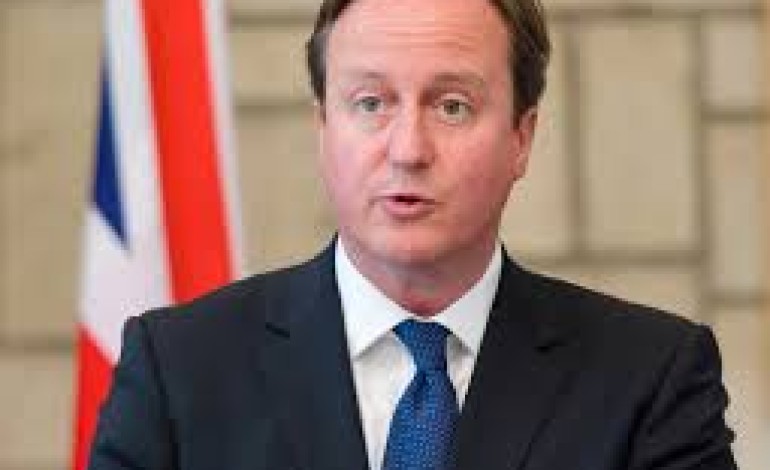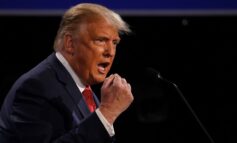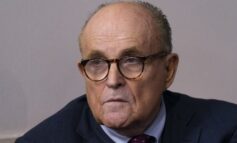Press here to view the video.
David Cameron: “This is a team that reflects modern Britain”
David Cameron is due to complete the final appointments in his biggest ministerial reshuffle later ahead of questions from MPs in the Commons.
The prime minister made sweeping changes to his front bench, replacing Education Secretary Michael Gove and Foreign Secretary William Hague.
Some junior posts are yet to be filled.
Mr Cameron will fly to Brussels for a European summit following the last Prime Minister’s Questions before the Commons’ summer break.
As his new-look cabinet starts work, Mr Cameron will join EU leaders to discuss the allocation of jobs in the new European Commission.
Lord Hill, who until the reshuffle was the Conservative leader in the House of Lords, is the government’s nomination as the UK’s commissioner.
Mr Cameron is expected to push for the peer to be given one of the key economic portfolios.
 Lord Hill is the UK’s pick for commissioner
Lord Hill is the UK’s pick for commissionerThe prime minister’s spokesman denied that Britain’s case for a top job would be weakened by Lord Hill being widely unknown. He would, the spokesman said, be treated with “very considerable respect” by EU figures.
The reshuffle was Mr Cameron’s biggest shake-up since becoming prime minister.
Mr Gove was replaced at education by former Treasury Minister Nicky Morgan, while Mr Hague stepped down as foreign secretary to be replaced by Philip Hammond.
 The prime minister insisted Mr Gove had not been demoted
The prime minister insisted Mr Gove had not been demotedMr Hammond’s defence portfolio was taken by Business Minister Michael Fallon.
Among the other changes announced:
- Liz Truss, a 38-year-old education minister who entered the Commons in 2010, was drafted into the cabinet as environment secretary
- Sir Bob Kerslake is to step down as head of the civil service in the autumn
- Sir Jeremy Heywood, the cabinet secretary, will also be head of the civil service
- David Jones was sacked as Welsh secretary to be replaced by his deputy Stephen Crabb
- David Willetts was replaced as universities minister by Greg Clark
- Justice Minister Jeremy Wright, a 41-year-old barrister, replaced Dominic Grieve as Attorney General, the government’s chief legal officer
- Baroness Tina Stowell, a former head of corporate affairs at the BBC, became the new leader of the House of Lords
- Mark Harper, who quit as immigration minister after admitting employing an illegal immigrant as a cleaner, returned as a work and pensions minister, and Nick Gibb – sacked in a 2012 reshuffle – returned to the education department
The number of women in cabinet went up from three to five, out of a total of 22 ministers in Mr Cameron’s top team. Ten women have been promoted so far, across government, with three taking ministerial jobs for the first time.
Analysis
Chris Mason, BBC political correspondent
With an election now just 10 months away this was a reshuffle less about the business of governing, and rather more about the business of winning next May.
Mr Cameron’s new line-up are the faces and voices that will articulate the Conservative message between now and polling day, attempting to soothe the anxieties of those who may have flirted with UKIP or been drawn towards Labour.
It would seem impossible, for instance, that the new Education Secretary Nicky Morgan will pick quite as many fights as her predecessor Michael Gove.
Philip Hammond, meanwhile, the new foreign secretary, once voiced the possibility of the UK leaving the European Union if a renegotiation of powers was unsuccessful.
Reshuffles, on their own, rarely shift opinion polls. But the prime minister will hope the impression a refreshed cast of ministers can leave over time can make a difference.
Mr Cameron denied the move to the whips’ office was a demotion for Mr Gove.
Asked if the change represented a “punishment” for Mr Gove’s recent spat with Home Secretary Theresa May, the prime minister said: “I can tell you, if you are prime minister, the chief whip is one of the most important jobs in government.
“I wanted one of my big hitters, one of my real stars, one of my great brains, someone who has done extraordinary things for education in this country, to do that job, to deliver the government’s programme, to help secure the future for our country.”
Labour described the reshuffle as a “massacre of the moderates”, saying it signalled a move to the right for the Tories.
Credit to BBc.














Leave a Reply